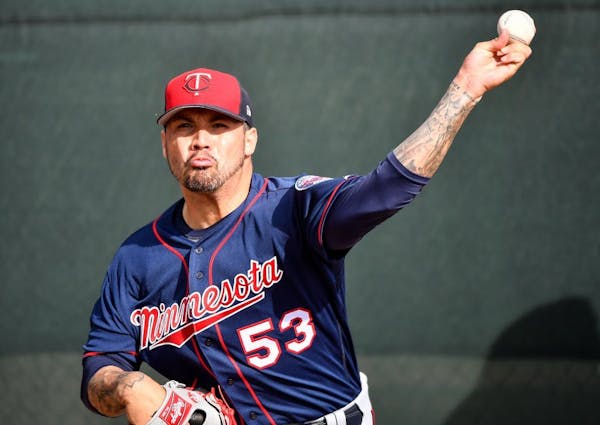FORT MYERS, Fla. – Jeff Pickler was in his first minor league spring training with the Brewers in 1999 when the major league club summoned a handful of young draftees to fill out the roster for the late innings of a Cactus League game. So Pickler hustled over to Milwaukee's clubhouse, put on the Brewers uniform that was hanging in his temporary locker and took the field to warm up.
He had only made a couple of throws when a team official gestured him over to the dugout. "He said, 'Son, go in the clubhouse and take that jersey off,' " Pickler recalled. " 'Nobody gets to wear No. 4 around here anymore.' "
Yes, that number belonged to future Hall of Famer Paul Molitor, and the Brewers would soon retire it permanently. Pickler, an infielder drafted in the 11th round the previous June, had simply pulled on the jersey he was given, and had no idea about the number's significance — or the man who wore it.
He knows a lot more about him now. The Twins hired Pickler to join Molitor's staff in December, one of three new coaches, and assigned him to work with the outfielders.
Pickler has found an eager audience.
"He's been great. He's helped me with some stuff I didn't really know about," said Byron Buxton, a pretty good defender already. "Like charging the ball — I usually stay back and read the hop, but he showed me how to attack it so the throw is shorter."
For Eddie Rosario, the emphasis has been "on making a better first step going to the ball," the left fielder said. "It gets me to the ball quicker."
And Robbie Grossman, a professional for nearly a decade, said, "He's gone over some things I've never thought about before. I've learned something every day." Specifically, Grossman said, "He's been working with me on receiving the ball softer, and it's been big for me. I can see the difference in the last couple weeks."
That's what Molitor was looking for when his new front-office bosses, Derek Falvey and Thad Levine, suggested the 41-year-old former scout, executive and infielder for the Twins' vacancy. And he is impressed with the coach's willingness to consider unconventional approaches — including new ways of examining statistics — in different situations.
"Pick's got a lot of layers," Molitor said. "He's embraced the outfield thing — the guys love him out there, that's been really positive. But his involvement in trying to dissect data and what we can use as a team, or for helping certain people trying to find a way to advance rather than stay stagnant — he's involved with a lot of stuff. … Pick comes over five, six times a day with questions or [suggestions]."
As an example, Molitor pointed to a Grapefruit League game vs. the Orioles last week. With two outs in the fourth inning, power hitter Chris Johnson came to the plate and light-hitting infielder Johnny Giavotella moved on deck. Pickler suggested moving the outfielders deeper by several steps — a no-doubles defense — because if Johnson singled, there was little risk of Giavotella driving him home from first.
"He's always thinking ahead," Molitor said. A no-doubles defense is normally used late in the game, not early, "but he's thinking about ways to gain edges and save runs on the defensive side."
Pickler, who holds a master's degree in teaching, said he's just grateful to find an organization, and a manager, that welcomes new ideas. "Believe me, I've had plenty of bad [ideas], too. I'm just trying to get them all out in spring training," said Pickler, who is the son of longtime Cyprus (Calif.) College baseball coach Scott Pickler. "Mollie's been great. The feeling that you could have somebody in my position feel comfortable sharing those ideas and information is a testament to him, not me. I'm really lucky."
Despite his deep baseball background, Pickler has never coached at the professional level, so he is impressed and excited with what he's found. Molitor, Falvey, Levine, Torii Hunter, Joe Vavra and others filled him in on the players he would coach, and it's been a good match thus far.
"One mistake we make is assume [that], 'Well, they're at this level, they must already know that.' But the development has to continue at the major league level," Pickler said. "The upside of this group [of outfielders] is tremendous. They want to get better, not because we're not very good, let's get better because we have a chance to be really special."
French Open to reveal second retractable roof court at Roland Garros ahead of Olympics
Thibodeau shows when he's mad at his Knicks. They don't mind, knowing the coach has them set to win
LSU's Jayden Daniels downplays issues with Commanders, says he'd be 'blessed' to go No. 2 overall

Edina sophomore two-sport standout on recruiting: 'Gotten a little busy'

